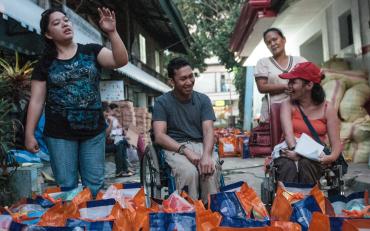Stakeholders Group of Persons with Disabilities Thematic Group on Disaster Risk Reduction and Climate Action
On behalf of persons with disabilities and their representative organizations as well as organizations working to enhance inclusion of persons with disabilities in Disaster Risk Reduction, we wish to express our gratitude to the government of Indonesia and the Office for United Nations Disaster Risk Reduction for organizing the Seventh Global Platform for Disaster Risk Reduction. We particularly appreciate measures taken to facilitate access of persons with disabilities to the Platform in line with the Convention on the Rights of Persons with Disabilities and the United Nations Disability Inclusion Strategy 2019, leading to enhanced inclusion and meaningful participation of the disability constituency.
Persons with disabilities make up at least 15% of the global population yet continue to be among those most impacted by disasters and more likely to be excluded from emergency preparedness, disaster risk reduction (DRR) and related decision-making processes.
The global Covid-19 pandemic clearly proved the structural inequality and exclusion faced by persons with disabilities across the globe causing disproportionate impact on their lives and livelihoods. As a result, the already existing barriers have been aggravated and new barriers emerged. We see the current transition era as a unique opportunity to address environmental, attitudinal, institutional and communication barriers faced by persons with disabilities, building more inclusive and participatory societies around the world where additional risks faced by persons with disabilities are measured, addressed and reduced with their participation and leadership.
Highlighting the need for participation of persons with disabilities through their representative organizations in building resilient societies, we call on Governments to ensure the implementation of the Sendai Framework and to fulfill their legal obligations under the Convention on the Rights of Persons with Disabilities (CRPD).
We ask to achieve this by prioritizing the development and implementation of fully inclusive DRR and climate action strategies, and promoting effective cross-sectoral partnerships through meaningful engagement with Organizations of Persons with Disabilities (OPDs) in all aspects of climate action and disaster risk reduction, including preparedness, response, and recovery by capitalizing on the following:
- Prioritize and integrate disability, gender, age and ethnicity disaggregated data collection as part of disaster management systems (including climate and risk assessments, emergency needs assessments and disaster loss and damage databases) at regional, national and local levels as well as national population censuses and surveys.
- Ensure effective representation and meaningful participation of persons with disabilities through their representative organizations in disaster and climate risk governance and related coordination mechanisms, including National Platforms for DRR and the humanitarian cluster system.
- Designate focal points for disability within the government units responsible for DRR and climate action and invest in their capacity development in close collaboration with representative Organizations of Persons with Disabilities.
- Ensure that DRR and Climate Change Adaptation (CCA) related policies, strategic frameworks and plans of action are inclusive, covering the diversity of disability, and informed by disability, ethnicity, gender and age analysis to prevent the expansion of inequalities exacerbated by climate change.
- Ensure that all disability-related policies, strategies and action plans include protection and safety of all persons with disabilities in situations of risk and humanitarian crises in-line with Article 11 of the CRPD.
- Ensure that all relevant actors in disaster response and risk reduction have the necessary capacity to include persons with disabilities in their activities.
- Include specific requirements of persons with disabilities, including women with disabilities, in leveraging investments for DRR and CCA (e.g., budgeting for reasonable accommodation and accessibility), and ensure that all investment strategies and their end results are fully accessible, inclusive and participatory for all of society.
- Allocate specific funding, led by OPDs, to enhance inclusion of persons with disabilities in DRR and CCA.
- Ensure meaningful participation of persons with disabilities and their representative organizations in emergency preparedness and contingency planning at national and local levels to fully address the specific requirements of all persons with disabilities, including women with disabilities and other under-represented groups such as children and youth, older persons, indigenous persons, those with intellectual, psychosocial or deafblindness, and LGBTQI persons with disabilities.
- Ensure that risk information, including early warning, alert systems, and crisis communication, is fully inclusive covering the diversity of disability, and is available in accessible formats including national sign languages, Easy-To-Read as well as languages of indigenous communities.
- Ensure that all newly built critical infrastructure including schools, hospitals and shelters are made safe and accessible following relevant national guidelines and the principles of Universal Design.
